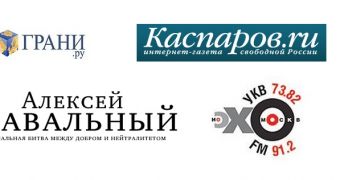The Russian government has blocked Internet users from accessing a number of websites that are known for criticizing the country’s President, Vladimir Putin. In response, hacktivist groups have disrupted some of the government’s websites.
Russia’s Federal Service for Supervision in the Sphere of Telecom, Information Technologies and Mass Communications (ROSKOMNADZOR) reports that the Grani newspaper (grani.ru), the site of the famous chess player Garry Kasparov (kasparov.ru), ej.ru and navalny.livejournal.com have been blocked.
The website of the radio station Ekho Moskvy (echo.msk.ru) is also reportedly inaccessible. The sites have all been blocked at ISP level.
Apparently, the Prosecutor General of the Russian Federation has asked that these websites be blocked because they call on visitors to take part in illegal activities and public events “held in violation of the established order.”
navalny.livejournal.com, the website of anti-corruption crusader Alexei Navalny, has been allegedly blocked because Navalny violated the conditions of his house arrest by accessing the Web.
Garry Kasparov posted the following message on Twitter in response to the blockade:
These are huge news sites, not political groups. Giant Echo of Moscow site now just gone. Grani, EJ, Navalny's blog, all blocked in Russia.
— Garry Kasparov (@Kasparov63) March 13, 2014 While the government is denying that these actions represent a form of censorship, many believe that this is an attempt to silence Putin’s critics. Among those who believe that this is the case, there are some hacktivists who have launched distributed denial-of-service (DDOS) attacks against a number of high-profile websites.
The list includes the website of the Kremlin (kremlin.ru) and the Central Bank of Russia (cbr.ru). At the time of writing, the Central Bank’s website is still inaccessible. The site of the Kremlin is working, but pages are loading slowly. More cyberattacks might follow if the websites are not unblocked.
The Electronic Frontier Foundation (EFF) has noted that it profoundly opposes the censorship of the Internet by the Russian government.
“We are especially concerned about the censorship of independent news and opposing political views, which are essential to a thriving civil society,” the EFF said.
The organization is urging Russians who still want to be able to access the websites to use the anonymity network TOR.
Russia enacted the law that enables the government to block websites in 2012. At the time, officials argued that the legislation would primarily be utilized to block websites related to drug use, sites containing child abuse content, and ones that promoted suicide.
However, now it’s being used against major news websites. Many fear that Russia will slowly become just like China, which is well known for its censorship.

 14 DAY TRIAL //
14 DAY TRIAL //